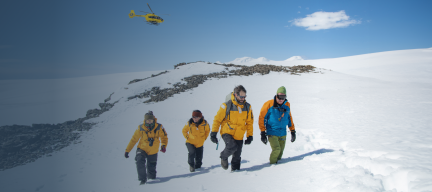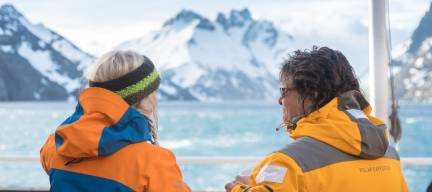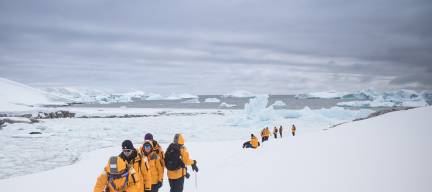Polar researchers and scientists with all types of specialities work across the Arctic and Antarctic regions to learn more about these unique areas and their delicate ecosystems. Finding the funding to travel to the most remote places on earth is an ongoing challenge, though; often, individuals and institutions alike simply can’t afford it.
That’s why each year, Quark Expeditions hosts several of these researchers and scientists on our Arctic and Antarctic expeditions, providing free passage to their remote areas of interest.

As we journey to the farthest reaches of the earth, we make a few berths available on each voyage for scientists, who then share their incredible perspective with passengers in at least one lecture per trip. Here, we’re speaking with our Scientists in Residence about the work they do while onboard with Quark, and sharing their insights with you in a series of blog posts.
Meet Anni Djurhuus
In the first column in our “Meet a Scientist in Residence” series, introduced you to Dr. Sandra Nogué, Ph.D. In this column, we’d like you to meet Anni Djurhuus, who is currently working on her DPhil dissertation at Oxford.
Anni’s previous research projects have seen her surveying wild salmon in the North Atlantic Ocean, studying the ecology of mackerel on the Faroe shelf, surveying five seamounts (four of them for the first time) and more.
Learning microbiology on an Antarctic expedition
Anni’s project centers on microbial community structure in oceans. As recently explained to Quark, “Briefly, the main goal of the project is to get a better view of microbial distribution and how well microorganisms mix between ocean masses, and if this could be used as indicators for seawater mixing, both with depth and between oceans.”
She is also working on a side project on microorganisms around hydrothermal vents in the Indian and Southern Oceans.

Onboard a Quark Expeditions vessel with a Scientist in Residence
Traveling with Quark will enable Anni to collect the otherwise inaccessible samples she needs for future research, she explained, adding, “Without Quark, the project briefly described above would not have been achievable.”
Onboard, Anni will be able to offer lectures on microorganisms and how important they are for larger organisms in the marine environment. “I have a broad knowledge of food web structures and can give context from the smallest being of the marine environment, linking it to the various animals passengers will see on their expedition in Antarctica,” she said.
“In addition I can talk about my future research, which will be based on samples collected with Quark.”

As to why this is important for polar travelers, Anni explained, “Marine microbiology is scarcely studied and is not taught in most high school or university level courses. I will bring a focus on organisms not visible to the naked eye and make passengers aware of the link between groups of organisms they were not aware of previously.”
To learn more about our Scientists in Residence or whether your upcoming expedition features such an expert, please contact our Polar Travel Advisers.









